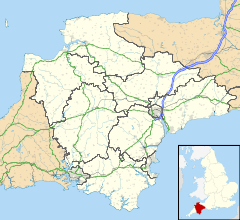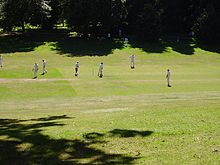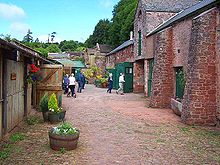- Cockington
-
Coordinates: 50°27′23″N 3°33′54″W / 50.45630°N 3.5650°W
Cockington
 Cockington shown within Devon
Cockington shown within DevonOS grid reference SX8963 Unitary authority Torbay Ceremonial county Devon Region South West Country England Sovereign state United Kingdom Police Devon and Cornwall Fire Devon and Somerset Ambulance South Western EU Parliament South West England List of places: UK • England • Devon Cockington is a village in Torquay in the English county of Devon. It is a picturesque village, with old cottages within its boundaries. It is about a half a mile away from Torquay.
Contents
History
The village was probably founded 2,500 years ago during the Iron Age with evidence of two hill forts on either side of Cockington valley.[citation needed] Little is known about Cockington from that point up until the remains of a small Saxon village were found near the Drum Inn. The evidence from this village shows that it was primarily a fishing and farming village. The first official documentation of the village was in the 10th century.[citation needed] The manor was owned by Alric the Saxon, before William Hostiarus, William de Falesia and Robert FitzMartin, who passed it down to his son Roger, who renounced his name to become Roger de Cockington. The Cockington family owned Cockington Estate from 1048–1348.[citation needed] The Cary family owned the court from 1375 to 1654. It was then sold to the Mallock family,[citation needed] a family of rich silversmiths from Exeter, who owned it from 1654 to 1932 when they sold the estate to the Torquay Corporation.
Buildings
There are several buildings of note in Cockington.
Cricket Pavilion and grounds
The park which is now home to the cricket grounds was originally a medieval deer park. Cricket started to be played on it in 1947. The current cricket pavilion was built after the original burnt down ten years ago.
Drum Inn
The Drum Inn is the local pub/restaurant in Cockington. Designed by Edwin Lutyens, it opened in 1936 to replace the old ale-house.
The Almshouses
The Almshouses consist of seven terraced cottages built during the reign of King James I of England by the Cary family to house the poor and those who could not work within the village. When the Mallock family took over the Cockington estate, the almshouses fell into disrepair. They were rebuilt between 1790 and 1810.
Cockington Court
Cockington Court was built over the remains of a medieval court. A far cry from the days of the Cary family when it was an actual court, it is now filled with various arts and crafts workshops.[1][2]
In her youth, Agatha Christie regularly visited Cockington. Her novel Why Didn't They Ask Evans? is dedicated to Christopher Mallock. The Mallock family were friends of Christie's from the years before her first marriage. The Mallocks staged amateur theatricals at Cockington Court, in which Christie, managing to overcome her usual crippling shyness, took part.[3][4]
Other notable buildings
- A church that has probably been around since the 11th century.
- A water mill that is in the middle of the village;
- Cockington Forge, which has been in the same place in the village for 500 years.
Notable residents
Chronologer Robert Cary was born in Cockington in about 1615.[5] Robert Sweet (1782-1835), horticulturalist and author, was also born in the village.[6]
See also
References
- ^ Cockington Court Craft Centre
- ^ Cockington Court Centre for Arts, Crafts and Culture
- ^ Cockington Court history
- ^ The Manor House
- ^ Hutton, Charles (1815). A philosophical and mathematical dictionary containing... memoirs of the lives and writings of the most eminent authors, Volume 1. Charles Hutton. p. 278. http://books.google.co.uk/books?id=1_E1AAAAQAAJ&pg=PA278&dq=cockington&hl=en&ei=pe9kTtjuI4aa-wbw4tybCg&sa=X&oi=book_result&ct=result&resnum=4&ved=0CDcQ6AEwAw#v=onepage&q=cockington&f=false.
- ^ Blewitt, Octavian (1832). The panorama of Torquay: a descriptive and historical sketch of the district comprised between the Dart and Teign. Simkin. pp. 270, 274. http://books.google.co.uk/books?id=I3wfAQAAMAAJ&pg=PA274&dq=cockington+%22robert+sweet%22&hl=en&ei=HfBkTuHXHI71-gb4pPSYCg&sa=X&oi=book_result&ct=result&resnum=3&ved=0CDMQ6AEwAg#v=onepage&q=cockington%20%22robert%20sweet%22&f=false.
External links
Categories:- Villages in Devon
- Torquay
Wikimedia Foundation. 2010.




